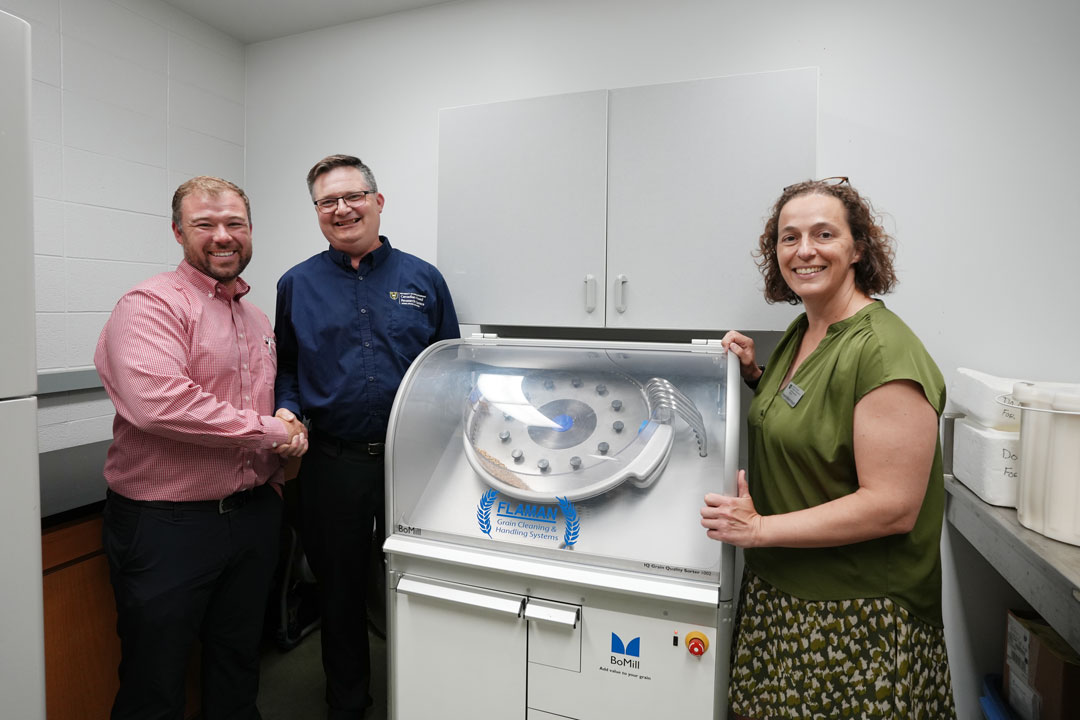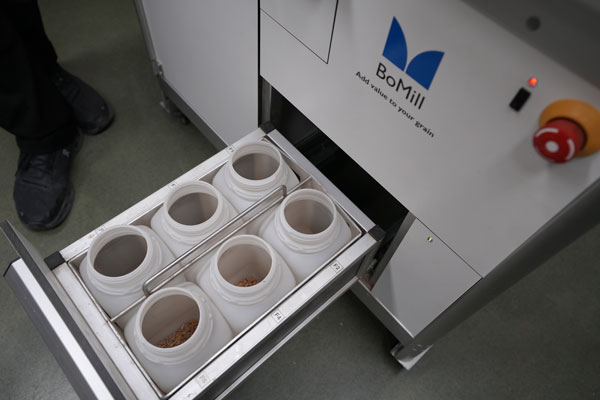
Flaman and BoMill change the game in seed research
Flaman donates innovative technology to AgBio to improve seed sorting.
By Ian GoodwillieCrop production is not just a game of maximum yield; it is, more importantly, a game of quality. No farmer wants to pull a subpar crop off the field or put subpar seed in the ground.
Superior quality yield and accurate seed grading is better for everyone involved along every step of the process. And it all starts with good research.
That’s where the BoMill Near Infrared Seed Sorter, aka the BoMill IQ, comes in. Donated to the University of Saskatchewan (USask) College of Agriculture and Bioresources (AgBio) by Flaman, this innovative piece of technology is already changing how seed is sorted. Wavelengths of infrared light with specific calibrations are used to determine a seed’s chemical composition. The BoMill IQ then sorts individual kernels of grain into one of six fractions.
“The idea behind the BoMill technology is to use every kernel for what it is best suited for,” said Andreas Jeppsson, CEO of BoMill. “The grain industry has until today been determining the quality by taking a few samples from each batch of grain, and based upon the average results of those samples, the quality of a batch is set.”
The infrared sorting system the IQ uses allows for individual sorting on a much deeper level, eliminating the assumptions that come with batch averages. How this incredible piece of technology came into the hands of AgBio is a simple story of the generosity of one group.
Flaman is a well-known company across Canada. While it is involved in a variety of ventures, it’s best known as one of agriculture’s strongest partners.
“Agriculture is where the Flaman roots started, and we are happy to contribute to continued innovation in the Western Canadian ag industry,” said Mitch Flaman, senior manager marketing and IT at Flaman.
It was Flaman which first brought the BoMill Near Infrared Seed Sorter to the region. And it was immediately on the radar of Dr. Rex Newkirk (PhD), an associate professor with AgBio.
The IQ wasn’t the first piece of BoMill equipment Newkirk had worked with over the years. The Canadian Feed Research Centre (CFRC) at USask has the TriQ. A major difference between the two units is the fact that the IQ is smaller and portable, meaning it can be used on site rather than just in the lab.

According to Newkirk, what sets the IQ apart from the TriQ is even more amazing.
“The new BoMill IQ donated by Flaman allows us to work on much smaller quantities of seed, advancing our research without the need to sort multiple tonnes of each product. The IQ also has the newest calibrations and software, allowing us to conduct a wider range of research.”
The connection between AgBio and Flaman has run deep for years. Flaman has long been a supporter of various aspects of the college’s work. That includes supplying equipment to the CFRC as well as equipment for use on campus. Not only has the company supported research done at the CFRC and the college, but it has also played a big part in bringing the results of that same research to prairie producers.
Flaman is keenly aware of the strength of this connection. “The University of Saskatchewan does tremendous work, contributing to AgBio, and having a close relationship with them is something we are proud of.”
As such, this donation is another major step on a path the two organizations have walked together for a long time. But this act of generosity in particular has resonated with Newkirk.
“This is an important donation,” said Newkirk. “Not only does it assist us with research using the most recent technologies, but it also gives us the opportunity to use the technology in our
teaching program. Our students need experience and exposure to the most recent advances in processing technology. Without access to the equipment, the students would not have the opportunity to get hands on experience with the technology.”
Flaman’s donation could prove to be equally important for BoMill, as well.
“This is a very good initiative and a great opportunity to assess how BoMill technology can create value and benefits with the different stakeholders throughout the grain industry supply chain,” said Jeppsson.
AgBio grad students have already incorporated this new technology into their research. Newkirk mentioned master’s student Meghan Taylor who used the IQ to sort fusarium-infected wheat and recovered a much larger amount of good quality grain than other cleaning methods could have achieved.
BoMill’s Near Infrared Seed Sorter may be a relatively recent addition to AgBio’s research arsenal, but it’s already making an impact. And without Flaman’s support, the technology simply would not be here.
Newkirk is thankful that Flaman stepped up, noting these kinds of partnerships are key to the long-term success of AgBio and its students.
“Without this donation of the IQ, we would not have the smaller more advanced unit that can be used anywhere in the college for both teaching and research,” he said.
Together, we will undertake the research the world needs. We invite you to join by supporting critical research at USask.

